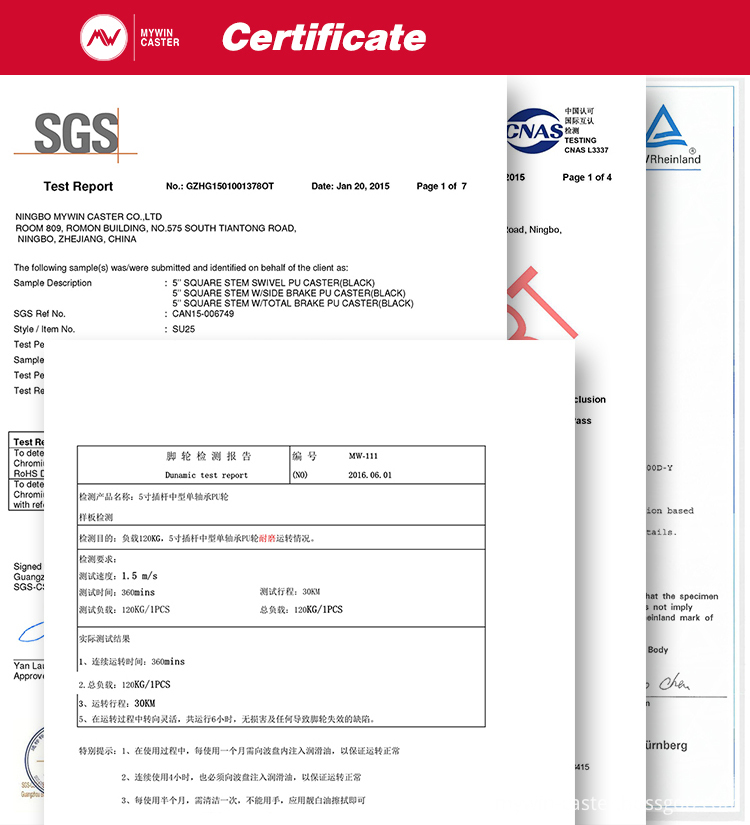This casters series is a user-friendly design. The bracket is aluminum alloy, the wheel material is PA, and the surface treatment is spraying. Auto adjustable casters can not only help make stationary items easier to move, they can also help users change the height of the item for improved access and stability. With an adjustable height swivel caster, you can have the ultimate in flexibility. So this casters series apply to many fileds, such as medical equipment, vending machines, processing equipment, heavy machinery and so on. Our auto adjustable caster wheel options are always top quality and available at significant discounts. We also provide information about each product to get details about the load capacity, stem dimensions, height ranges, additional features, and more.
Our products is certify to high quality according to the international standards.
Auto Adjustable Casters, Braked Adjustable Caster, Bolt Hole Swivel Adjustable Caster, Plate Swivel Adjustable Caster Wheel Ningbo Mywin Caster Co., Ltd. , https://www.mywin-caster.com
The diamond saw blade case was filed by the US industry in 2005. Although the US Department of Commerce had already made a final ruling on the dumping of Chinese companies, the case was finally settled with the US International Trade Commission's ruling that there was no industry damage. Later, the US industry filed an appeal against the US International Trade Commission's ruling and successfully overturned the ruling in a few years. At the end of the appeal against the US International Trade Commission's ruling, the appeal against the US Department of Commerce's ruling also began (the US Department of Commerce's ruling was frozen because of the US International Trade Commission's ruling). In other words, the US court began reviewing the ruling after the US Department of Commerce ruled for six years.
In the original final ruling, the US Department of Commerce ruled that responding to Chinese companies has proved that they are legally and de facto independent of the Chinese government, so the corresponding tax rate applies to Chinese companies. In this case, although the Chinese government entity China Iron and Steel Research Group Co., Ltd. ("China Steel Research") partially holds the shares of the responding company, the US Department of Commerce has ruled that the responding company can apply a separate tax rate. In the ruling, the analysis of the US Department of Commerce focused on the manufacturer of the product under investigation and determined that the company was not under the control of the Chinese government.
When appealing to the US Court of International Trade, the US industry argued that the US Department of Commerce did not consider the impact of government indirect investment on business operations. The US Court of International Trade recognizes the claims of the US industry and sends the case back to the US Department of Commerce for re-examination in order to make a more detailed analysis of the impact of government indirect investment on the company. After the US ruling was appealed to the US International Trade Court for the second time, the US Department of Commerce finally concluded in a protest that the Chinese responding company failed to prove that it was in fact not under the control of the Chinese government. Specifically, the US Department of Commerce has determined that Sinosteel Research has the ability to influence the selection of management of responding companies by exercising shareholder rights. Although the case was finally appealed to the higher court of appeal in 2015, the Court of Appeal upheld the original judgment. The US Department of Commerce still decided not to participate in the appeal in the event of a controversial decision, stating that it did not completely disagree with the outcome of the case. 
Abstract The applicable standards for separate tax rates for government-invested companies were proposed by the US Department of Commerce in the 2006 “Diamond Saw Blades from China†ruling. After the ruling, the US industry filed a lawsuit with the US court. Diamond saw blade case by the US industry...
The applicable criteria for separate tax rates for government-invested companies were proposed by the US Department of Commerce in the 2006 Diamond Diamond Saws Case from China. After the ruling, the US industry filed a lawsuit with the US court.